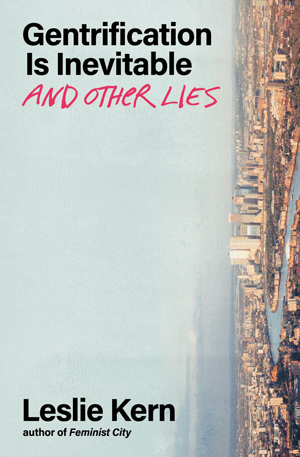Over the past four decades the population of Alberta’s largest cities has grown increasingly segregated by income, class and race, yet gentrification is seldom discussed in our province. Gentrification is instead called “revitalization” or “regeneration” by city planners, real estate developers and elected officials, which positive spin limits action not only in addressing causes and consequences but also in finding alternative ways for a city to evolve. Fortunately, this is precisely the focus of Gentrification is Inevitable and Other Lies.
Drawing from the work of scholars across disciplines, Leslie Kern succinctly describes the drivers that displace and replace working-class residents with a more affluent demographic. She also dispels the myths that place the onus of gentrification on the choices and preferences of the “creative class.” Most importantly, she emphasizes the need to imagine an alternative city that addresses the inequities at the core of capitalism, namely colonialism, racism and sexism. “Under capitalism,” Kern writes, “gentrification will always be read as success.”
While the relative affordability of Alberta cities may relegate gentrification to the back burner, Kern’s analysis of Vancouver, Toronto, San Francisco and London, among other cities, functions as a cautionary tale of what Calgary and Edmonton can expect. While Calgary’s East Village and the redevelopment of The Quarters in downtown Edmonton are both portrayed as success stories by city planners, the people displaced by these master plans are disregarded until issues—such as long wait lists for affordable housing, or the rise of “public disorder” near comparatively affluent residents—occur elsewhere.
In the capitalist city, however, this is a feature, not a bug. “The post-industrial city is often an entrepreneurial city, one that actively seeks to generate growth and profit, rather than to simply manage growth and distribute services,” Kern writes. Gentrification disproportionately displaces and marginalizes low-income women, seniors and immigrants, and welcomes mostly white “creatives” and tech workers—just as Calgary and Edmonton aspire to do. Ultimately, says Kern, city governments legitimize and disregard the displacement of less-affluent residents. “Cities are now quite deliberately sparking middle-, upper– and even investor-class reinvestment in the city, while promoting policies that smooth the path for particular kinds of real estate and commercial developments.”
But hope still exists. “If we accept that gentrification and displacement are not inevitable,” writes Kern, emphasizing the role that community members can play in disrupting the status quo, “we can start to see the potential to make different choices.”
Ximena González is a writer and editor in Calgary.


